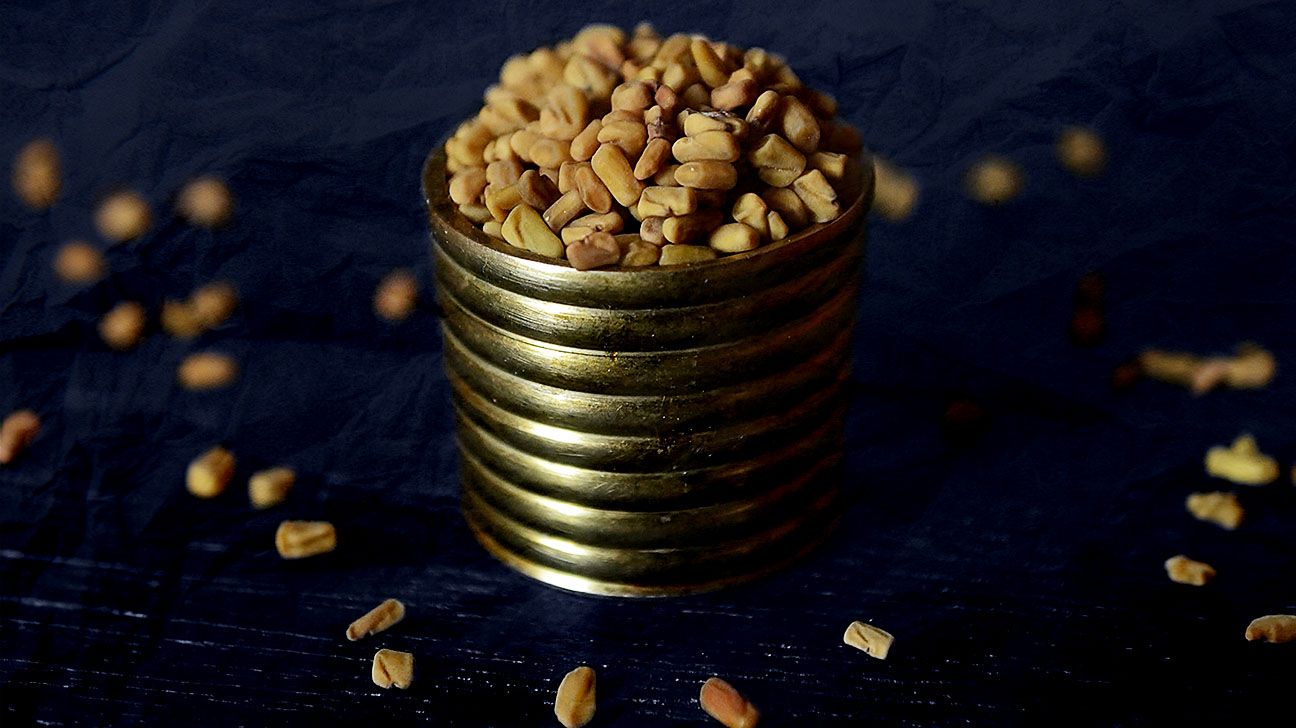Possible benefits of fenugreek include helping to manage blood sugars and raising testosterone levels. However, research is limited, and fenugreek may also cause adverse effects.
People use fenugreek seeds, or methi seeds, as a spice, flavoring agent, and supplement. Fenugreek is a clover-like herb in the same family as soy, beans, lentils, and peas. Its seeds taste and smell similar to maple syrup.
For centuries, people in North Africa, Asia, and southern Europe have used fenugreek to stimulate breast milk production.
However, large doses of fenugreek may cause a harmful drop in blood sugar and symptoms such as diarrhea, nausea, and digestive issues.

The dried seeds of the fenugreek plant (Trigonella foenum-graecum) are used in traditional ayurvedic medicine to help relieve inflammation, act as a laxative, and increase breast milk supply.
People can use fresh or dried fenugreek as an ingredient in culinary dishes to add a sweet, nutty, and slightly bitter flavor.
Fenugreek extracts are ingredients in many products, including:
- soaps
- cosmetics
- teas
- garam masala, a spice blend
- condiments
- imitation maple syrup products
Yes, fenugreek contains very small amounts of many essential
- fiber
- calcium
- iron
- magnesium
- phosphorous
- potassium
Currently, there is
However, people have been using fenugreek in varying forms for
However, researchers have only studied a few of the reported health benefits of fenugreek, and there is little reliable evidence of its health benefits.
Some research suggests that fenugreek may:
Reduce the risk of diabetes
People may use fenugreek as a complementary therapy for diabetes.
A 2023 systematic review and meta-analysis of studies reported that fenugreek:
- can help manage blood sugar levels
- can improve cholesterol levels
- has no severe side effects
The authors concluded that it is a safe and beneficial treatment for type 2 diabetes.
Another systematic review and meta-analysis from the same year raised concerns about the quality and variation of the studies. The authors called for more rigorous trials to investigate fenugreek’s effects on diabetes management.
Learn more about fenugreek and diabetes.
Improve breast milk production
Fenugreek may help stimulate breast milk production and ease the flow. Practitioners of traditional Asian medicine have long recommended fenugreek for this purpose.
The authors of a
People can take
Learn about other foods that can help with lactation.
Improve weight loss
Some research suggests that fenugreek may suppress the appetite and increase feelings of fullness, which could help reduce overeating and lead to weight loss.
Due to its high fiber content, fenugreek fiber extract powders may lead to a feeling of fullness.
In an older
There is a lack of recent research into fenugreek’s effects on appetite, and more high quality studies are necessary.
Raise testosterone and boost sperm count
Fenugreek may help increase low testosterone and sperm levels.
In a
- sperm count increased for 85% of the participants
- testosterone levels improved for 90% of the participants
The researchers also noted improvements in mental alertness, mood, and libido.
However, the study may be biased because it was funded by a supplement company. It was also an open-label study with no control group. This means the participants were aware they were taking fenugreek, which may have influenced their judgments about its effects.
Reduce inflammation
Fenugreek’s high antioxidant levels give it great potential as an anti-inflammatory agent.
Researchers in a
Human studies looking at fenugreek’s anti-inflammatory properties are necessary.
Reduce the risk of heart and blood pressure conditions
Fenugreek may help
A 2023 systematic review and meta-analysis concluded that taking fenugreek seed supplements, particularly in doses of 15 g or more per day for up to 12 weeks, may help lower systolic blood pressure but not diastolic blood pressure. However, more research is necessary to bridge the gap between these findings and clinical practice.
Fenugreek’s effect on blood pressure may be due to its high dietary fiber content of around 25%. Certain types of dietary fiber form a viscous gel in the intestines, making it
Some common unwanted
Some people have also experienced allergic reactions to fenugreek, although this is rare.
Pregnant people should avoid using fenugreek in high doses as it may increase the chance of birth irregularities. However, consuming fenugreek in food is safe. It is unclear whether it is safe for those who are nursing to take fenugreek in high doses.
A person with a health condition or taking prescription medications or other supplements should talk with a doctor before trying fenugreek supplements.
People have used fenugreek for centuries to treat conditions ranging from unstable blood sugar to low testosterone. People commonly use it to increase breast milk supply.
Fenugreek may also have other health benefits, such as regulating cholesterol levels, reducing inflammation, and helping with weight loss. However, more research into these benefits is necessary.
People with a health condition or taking prescription medications can speak with a doctor before taking fenugreek supplements.
